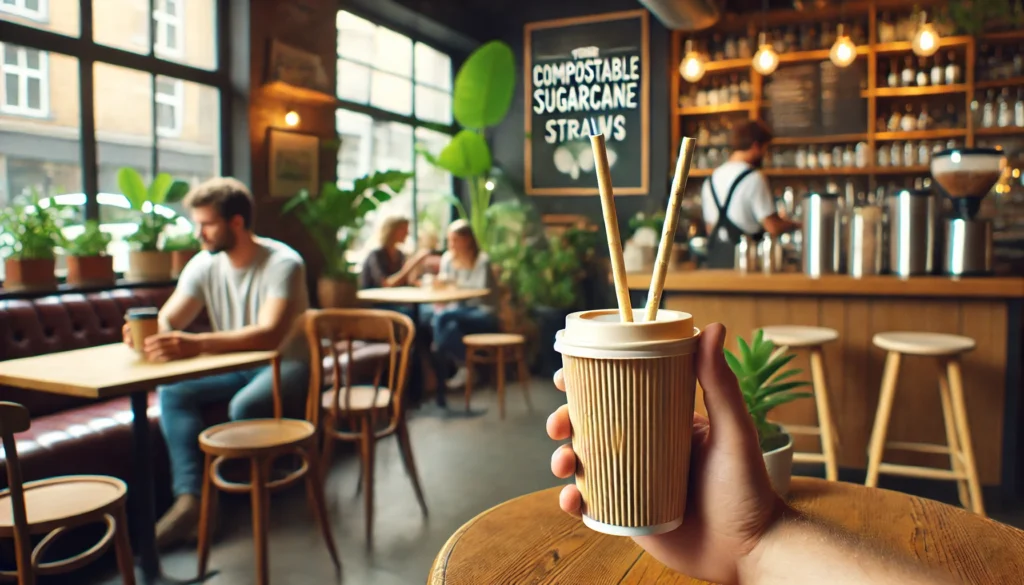
Sürdürülebilirliğin bir seçenek olmaktan çıkıp zorunluluk haline geldiği bir dünyada, kahvehaneler çevre dostu uygulamaların benimsenmesinde başı çekiyor. Sorumlu kaynaklardan elde edilen kahve çekirdeklerinden geri dönüştürülebilir ambalajlara kadar yeni bir yeşil inovasyon dalgası gelişiyor. Böyle bir değişiklik, plastikten kompostlaştırılabilir pipetlere geçiştir; daha yeşil bir geleceğe doğru basit ama etkili bir adım. Her yudum, sürdürülebilir bir gezegene katkıda bulunmak için bir fırsat haline gelir ve kahveyi günlük bir alımdan daha fazlası haline getirir; bu çevre bilincine yönelik bir harekettir.
The Plastic Straw Predicament
Traditional plastic straws have long been a staple of convenience, but they come with a hidden environmental cost. Made from non-biodegradable materials, these straws take hundreds of years to break down. Every year, millions of plastic straws end up in oceans, harming marine life and polluting ecosystems. This plastic waste also affects communities, clogging waterways and contributing to global pollution crises. Coffee shops, as key players in the food and beverage industry, have a unique role in addressing this issue.
The Shift in Consumer Expectations
Günümüzün müşterileri her zamankinden daha fazla çevre bilincine sahip ve daha yeşil alternatifler talep ediyorlar. Sosyal medya platformları bu sesleri güçlendiriyor, sürdürülebilir markaları yücelten ve savurgan uygulamaları utandıran trendler yaratıyor. Kahve dükkanları için kompostlanabilir pipetleri kullanmak artık bir seçim değil; gelişen tüketici değerlerine ayak uydurmak için bir zorunluluk. Çevre dostu seçenekler sunmak artık satın alma işlemlerinin kendi ilkeleriyle uyumlu olmasını isteyen sadık, sosyal sorumluluk sahibi müşterilerin ilgisini çekmeyle el ele gidiyor.
What Are Compostable Straws?
Compostable straws are a sustainable alternative to traditional plastic straws. Unlike plastic straws, which persist in the environment for centuries, compostable options are designed to break down naturally over time, leaving no harmful residue. These straws are typically made from renewable, plant-based materials, making them a safer and more environmentally friendly choice. They offer coffee shops a way to reduce waste while maintaining excellent functionality.
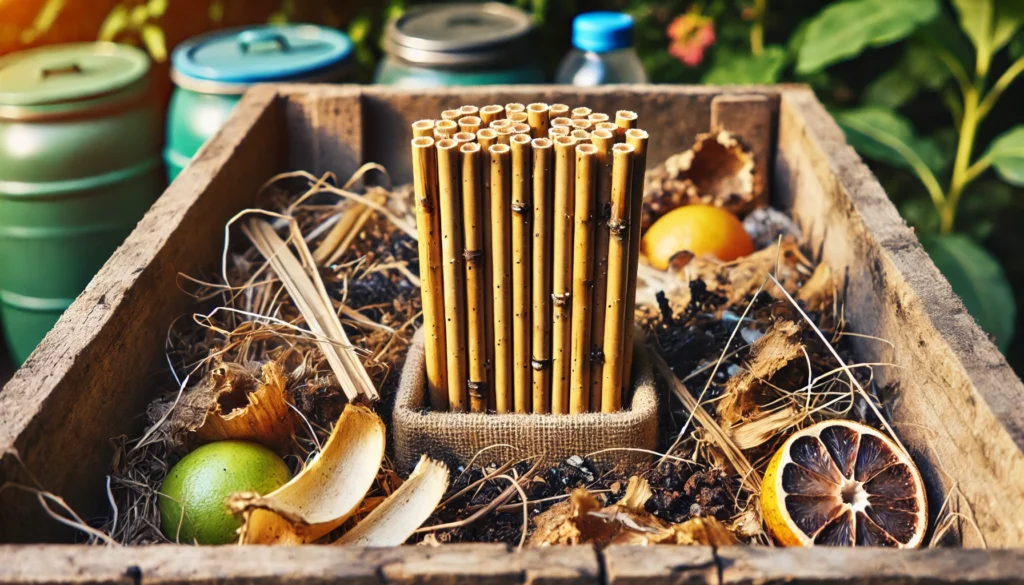
The Science Behind Biodegradation
The process that makes compostable straws eco-friendly is called biodegradation. When disposed of in the right composting environment, these straws decompose into organic matter, such as water, carbon dioxide, and nutrient-rich soil. This process can take as little as a few weeks, depending on the material and composting conditions, ensuring that what was once a straw returns to nature without harming the planet.
Materials That Make a Difference
The materials used to make compostable straws are as diverse as they are innovative. Popular options include:
- Şeker kamışı: A byproduct of sugar production, sugarcane fiber creates durable and eco-friendly straws. For instance, NatureBioEco’s Eco-Friendly Boba Sugarcane Straw Ø12mm × 210mm offers a sustainable option for boba tea enthusiasts.
- Bambu: A fast-growing and renewable resource, bamboo offers a natural and biodegradable option.
- Polylactic Acid (PLA): Derived from cornstarch, PLA straws mimic the look and feel of plastic but are fully compostable.
- Kağıt: While traditional, paper remains a functional and biodegradable choice, especially for cold drinks.
By leveraging these materials, coffee shops can offer straws that are both environmentally friendly and effective.
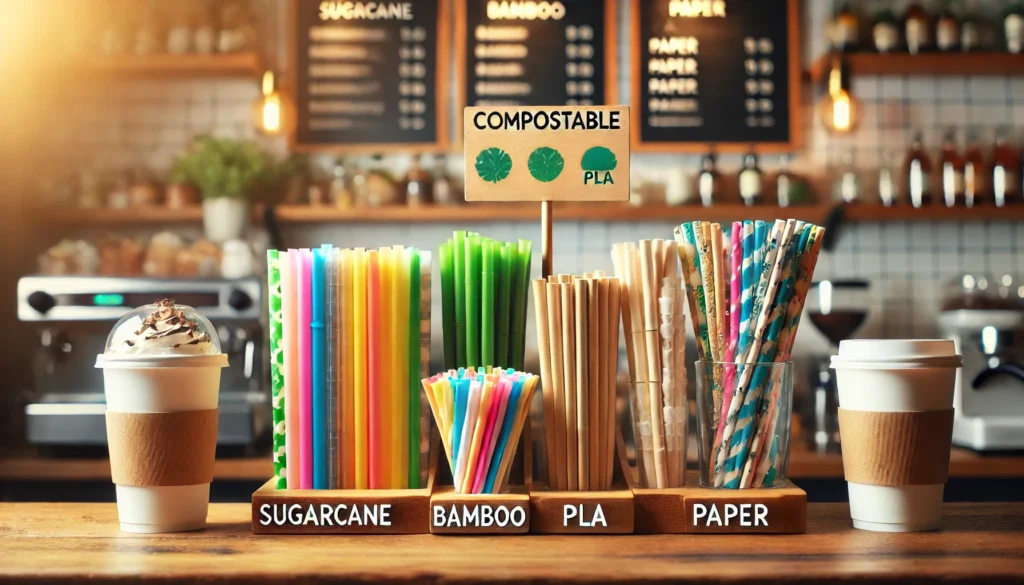
Design and Functionality: More Than Just Eco-Friendly
One of the main concerns with compostable straws is functionality. However, modern designs ensure that these straws balance durability and sustainability. They are resistant to sogginess, hold up well in cold and hot beverages, and even come in aesthetically pleasing designs. This ensures that customers can enjoy their coffee experience without sacrificing the practicality they expect.
Economic Benefits for Coffee Shops
Switching to compostable straws may seem like an expensive endeavor initially, but it can lead to longer-term economic benefits:
- Waste Management Savings: Compostable straws reduce plastic waste, potentially lowering disposal costs.
- Customer Retention: Eco-conscious initiatives can attract new customers and retain existing ones, boosting revenue.
- Mevzuata uygunluk: Adopting compostable straws can help coffee shops stay ahead of government regulations banning single-use plastics.
Enhancing Brand Image with Green Practices
Sustainability isn’t just good for the planet—it’s good for business. Customers are more likely to support brands that share their environmental values. By transitioning to compostable straws, coffee shops can build a strong green reputation, inspiring customer loyalty and turning sustainable initiatives into a competitive advantage.
Case Studies: Success Stories in the Coffee Industry
From local cafés to global coffee chains, many businesses have successfully transitioned to compostable straws:
- Starbucks: Pioneering efforts in replacing plastic straws with compostable sippy lids and eco-friendly straws. In Japan, Starbucks introduced Green Planet™ biodegradable, plant-based straws, which emit less carbon dioxide throughout their lifecycle compared to traditional paper straws. citeturn0search3
- Blue Bottle Coffee: Emphasizing sustainability by adopting compostable straws and encouraging customers to use reusable options.
- Local Cafés: Small businesses have found that marketing their eco-friendly efforts resonates well with their communities.
These examples demonstrate that the switch is not only feasible but also beneficial across the industry.

Overcoming Challenges in the Transition
Switching to compostable straws isn’t without its challenges. Some hurdles include higher upfront costs, supply chain complexities, and educating staff about the new products. However, these obstacles can be mitigated through:
- Building relationships with eco-friendly suppliers: Sourcing from reputable manufacturers ensures a steady supply of high-quality compostable straws. For example, NatureBioEco’s sugarcane straws are made from renewable materials and offer excellent durability.
- Buying in bulk to reduce costs: Larger orders can help coffee shops lower per-unit expenses. Options such as Bireysel olarak sarılmış Boba Kahve Grows Pipets provide a practical solution for businesses that need sanitary, grab-and-go alternatives.
- Conducting employee training to ensure a smooth transition: Educating staff about the benefits and proper use of compostable straws will enable them to advocate for the change and answer customer questions effectively.

Employee Training and Customer Engagement
A successful transition requires buy-in from both staff and customers. Employees should be well-informed about compostable straws to confidently explain their advantages. Coffee shops can further enhance customer engagement by:
- Kullanma in-store displays Ve informational cards to highlight the benefits of compostable straws.
- Offering sampling opportunities for customers to test compostable straws like sugarcane smoothie straws.
- Encouraging customer feedback and rewarding eco-conscious behavior, such as bringing reusable straws.
Sustainability Marketing: Turning Green into Gold
Eco-friendly practices aren’t just a trend—they’re a powerful marketing tool. Coffee shops can promote their switch to compostable straws through:
- Sosyal medya kampanyaları featuring success stories and customer testimonials. For example, global chains like Starbucks Japan have successfully transitioned to biodegradable straws.
- Highlighting sustainability initiatives on coffee menus, reinforcing the message that customers are making an eco-friendly choice.
- Sharing environmental impact data to showcase plastic waste reduction. Businesses using NatureBioEco’s eco-friendly cocktail coffee grounds straws can emphasize their role in sustainable hospitality.
Collaborations and Partnerships
Partnering with suppliers and sustainability organizations can simplify the transition. Coffee shops can collaborate with:
- Eco-friendly packaging manufacturers for a full sustainability overhaul.
- Green business alliances like the Sustainable Coffee Challenge veya Plastic Pollution Coalition to enhance credibility.
- Local environmental groups to host community clean-ups, strengthening their eco-conscious reputation.
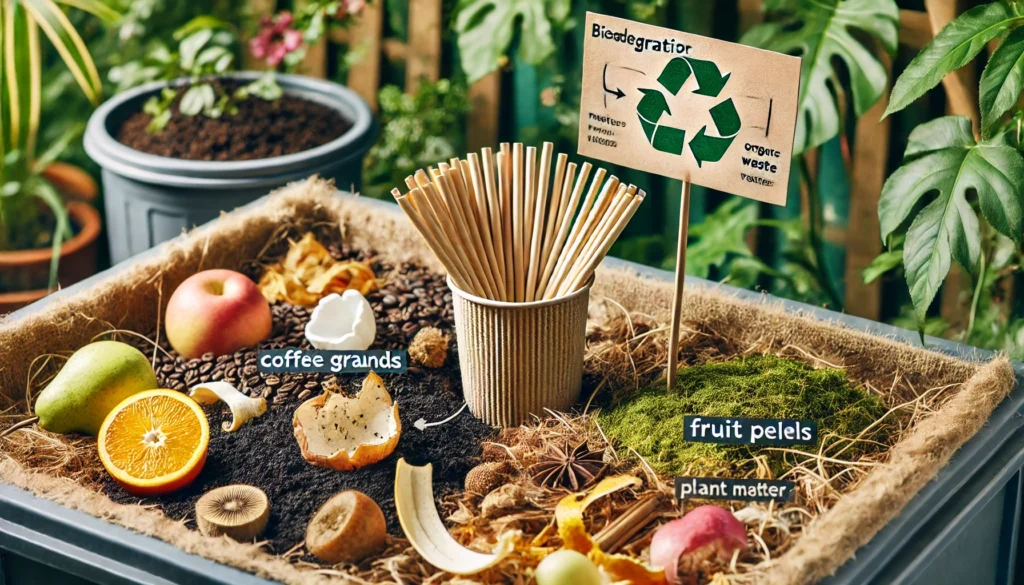
Future Trends in Compostable Technology
The journey toward sustainability doesn’t stop with straws. Emerging innovations continue to transform the industry, including:
- Improved compostable materials that enhance durability.
- Biodegradable accessories like coffee cup lids and stirrers.
- Zero-waste packaging for the coffee sector, reducing landfill waste.
Implementing a Seamless Transition
A structured approach ensures a smooth shift to compostable straws. Here’s a step-by-step guide:
- Research eco-friendly suppliers: Compare quality, pricing, and certifications before choosing a provider like NatureBioeco.
- Test straw functionality: Conduct trials with different beverages, such as smoothies or iced coffee, to determine compatibility.
- Train employees: Provide staff with educational resources and FAQs.
- Launch a marketing campaign: Utilize social media, newsletters, and store promotions to announce the transition.
- Monitor customer feedback: Gather insights and refine the strategy as needed.

Measuring the Environmental Impact
Tracking tangible benefits helps demonstrate progress:
- Measuring reductions in plastic waste through internal waste audits.
- Tracking compostable waste disposal rates to ensure proper breakdown.
- Sharing sustainability milestones through reports or blog posts on corporate websites.
Consumer Participation: Making It a Movement
Encouraging customers to participate in sustainability efforts increases engagement. Consider:
- Offering rewards: Discounts for bringing reusable straws or cups.
- Hosting community events: Partnering with eco-conscious brands for workshops on sustainable living.
- Sharing educational content: Blog posts and eco-tips on social media can boost awareness.
Policy and Regulatory Influences
Government bans on single-use plastics are increasing worldwide. By proactively switching to compostable straws, coffee shops ensure compliance with upcoming regulations while reinforcing their position as industry leaders.
Brewing a Greener Future
Adopting compostable straws is more than a small operational change—it’s a commitment to sustainability. By implementing çevre dostu uygulamalar, coffee shops can:
- Reduce plastic pollution.
- Enhance brand reputation.
- Attract environmentally conscious customers.
Every compostable straw used is a step toward a greener future.
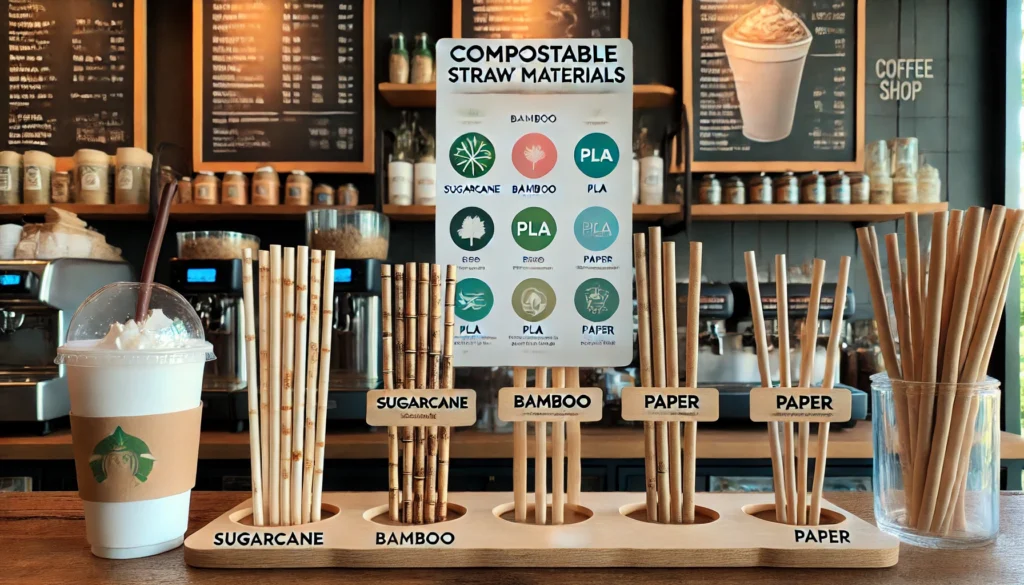
Join the Compostable Revolution
As a coffee shop owner, the time to act is now. By switching to compostable straws, your business contributes to global sustainability while appealing to eco-conscious consumers.
🌱 Take the first step today! Explore NatureBioEco’s range of compostable straws Burada.
Together, we can make a difference—one sip at a time.
FAQs: Compostable Straws for Coffee Shops
- What are compostable straws made of?
Compostable straws are typically made from plant-based materials such as şeker kamışı, bambu, cornstarch-based PLA, Ve paper, all of which break down naturally in composting environments. - How long does it take for compostable straws to degrade?
The degradation time varies based on the material and composting conditions. Sugarcane and paper straws break down within 12-16 months, while PLA requires industrial composting facilities. - Are compostable straws as durable as plastic straws?
Yes! High-quality compostable straws, like NatureBioEco’s sugarcane straws, are designed to withstand hot and cold beverages without becoming soggy or breaking down too quickly. - Can compostable straws be recycled?
No, compostable straws should not be placed in regular recycling bins. Instead, they should be disposed of in ticari kompostlama tesisleri or home composting systems if the material allows. - Do compostable straws cost more than plastic straws?
Initially, compostable straws may have a higher price than traditional plastic ones, but bulk purchasing and growing consumer demand have made them more affordable and cost-effective over time. - Do compostable straws affect the taste of beverages?
No, premium compostable straws like sugarcane fiber straws do not alter the taste of drinks. Unlike some kağıt payet, they maintain a neutral taste and strong structure. - Are compostable straws legally required in certain areas?
Many countries and states have introduced bans on plastic straws, including California, the EU, and Canada, making compostable alternatives a necessity for compliance. - Where can coffee shops purchase high-quality compostable straws?
Businesses can source compostable straws from eco-friendly suppliers like NatureBioEco. Explore sustainable options such as:







